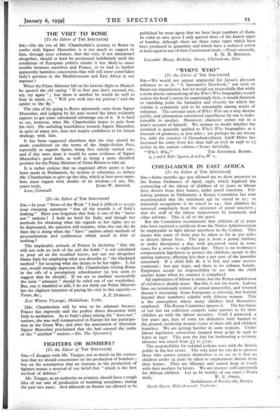CHILD-LABOUR IN EAST AFRICA
[To the Editor of THE SPECTATOR] SIR,—Some months ago you allowed me to draw attention to the Kenya Ordinance of April, 1938, which legalised the contracting of the labour of children of Io years in labour lines distant from their homes, under penal sanctions. Fol- lowing protests in Parliament, a Kenya Committee has now recommended that the minimum age be raised to 12 ; in industrial occupations it be raised to 14 ; that children be removed completely from the operation of penal sanctions ; that the staff of the labour inspectorate be increased, and other reforms. This is all to the good.
But the Committee recommends that children of 12 years who have received a certificate from the Native Administration be employable in light labour anywhere in the Colony. This means that many of them may be taken as far as Soo miles to distant labour lines. The pay is from a penny farthing to under threepence a day, with piecework extra in some cases, for a seven- to eight-hour day. There is no workmen's compensation legislation to protect the children, except in the mining industry, affecting less than 5 per cent. of the juveniles concerned. If a child falls ill, it is fed, and some receive treatment ; but pay stops, and there is no sickness benefit. Employers accept no responsibility to see that the child reaches home when its contract is convicted.
All exploitation of labour is mean, but the Kenya exploitation of children is doubly mean. But this is not the worst. Labour lines are notoriously centres of sexual immorality, and venereal disease is increasing. Some Europeans (a minority, but baneful beyond their numbers) cohabit with African women. This is the atmosphere where many children find themselves employed. The Kenya Committee ignores it. The harshness of our but tax collection compels some parents to let their children go with the labour recruiter. Until I protested, a few years ago, huts of some tax defaulters were burned to the ground, rendering women (some of them old) and children homeless. We are getting harsher in some respects. Under labour legislation convictions jumped from 4,797 in 1936 to 8,810 in 1937. This year the fine for harbouring a runaway labourer was raised from Ls to L150.
The responsibility for colonial policies rests with the British public in the last resort. The very least we can do to protect those who cannot protect themselves is to see to it that no children under 14 years be taken to employment distant from their homes. They are illiterate and cannot keep in touch with their mothers by letters. We are trustees (self-appointed) for African children. Let us be worthy of our trust —Yours
Archdeacon of Kavirondo, Kenya. Stocks Grem. Hild:nborough. Tanbridg..










































 Previous page
Previous page